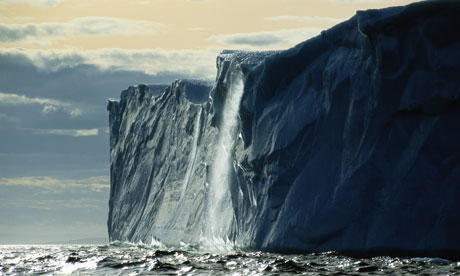The Ondaatje prize shortlist includes novels from Rahul Bhattacharya and Teju Cole, but which are your favourite books which evoke 'the spirit of a place'?

'The only cities were of ice' ... A melting iceberg off the coast of Newfoundland. Photograph: Richard Olsenius/ National Geographic / Getty Images
The shortlist for perhaps my favourite of the literary awards has just been announced: the Ondaatje prize, which goes to the "book of the highest literary merit – fiction, non-fiction, poetry – evoking the spirit of a place". This year a wonderfully varied lineup of titles is in the running, from Rahul Bhattacharya's evocation of Guyana in his first novel The Sly Company of People Who Care, to Olivia Laing's meditation on the Ouse, To the River, and from Teju Cole's slice of New York Open City to Paul Farley and Michael Symmons Roberts's exploration of urban sprawl, Edgelands.
I love how the Ondaatje prize manages to be both extremely specific (the Booker just rewards "the very best book of the year", for example) and utterly vague with its "spirit of a place". Past winners, from Edmund de Waal's tracing of his family history through a collection of netsuke, The Hare with Amber Eyes, to James Meek's Siberia-set novel The People's Act of Love, show the many different ways this can be interpreted.
There's already been some discussion among our readers about the ultimate "city" novels, with frustratedartist singing the praises of It's a Battlefield by Graham Greene: "It's all very fragmented, very atmospheric, and very cinematic. In fact, it would be a good candidate for a 'London novel' of the type Lukethedrifter was thinking about in his post last week." But maybe we should widen our field of enquiry.
Julia Blackburn's Thin Paths, hailed by the judges for its "engrossing, almost obsessive engagement with the history of an Italian mountain village", and Tim Robinson's Connemara make up the rest of this year's Ondaatje shortlist, but the recent novel that summons up the "spirit of a place" for me is The Shipping News. I read it while in Newfoundland and was consumed by Annie Proulx's evocation of this harsh, remote, stunning island, where travellers were "drawn by the cod, from the days when massed fish slowed ships on the drift for the passage to the Spice Isles", where "the only cities were of ice, bergs with cores of beryl, blue gems within white gems, that some said gave off an odour of almonds". But what would you choose?
I love how the Ondaatje prize manages to be both extremely specific (the Booker just rewards "the very best book of the year", for example) and utterly vague with its "spirit of a place". Past winners, from Edmund de Waal's tracing of his family history through a collection of netsuke, The Hare with Amber Eyes, to James Meek's Siberia-set novel The People's Act of Love, show the many different ways this can be interpreted.
There's already been some discussion among our readers about the ultimate "city" novels, with frustratedartist singing the praises of It's a Battlefield by Graham Greene: "It's all very fragmented, very atmospheric, and very cinematic. In fact, it would be a good candidate for a 'London novel' of the type Lukethedrifter was thinking about in his post last week." But maybe we should widen our field of enquiry.
Julia Blackburn's Thin Paths, hailed by the judges for its "engrossing, almost obsessive engagement with the history of an Italian mountain village", and Tim Robinson's Connemara make up the rest of this year's Ondaatje shortlist, but the recent novel that summons up the "spirit of a place" for me is The Shipping News. I read it while in Newfoundland and was consumed by Annie Proulx's evocation of this harsh, remote, stunning island, where travellers were "drawn by the cod, from the days when massed fish slowed ships on the drift for the passage to the Spice Isles", where "the only cities were of ice, bergs with cores of beryl, blue gems within white gems, that some said gave off an odour of almonds". But what would you choose?
No comments:
Post a Comment